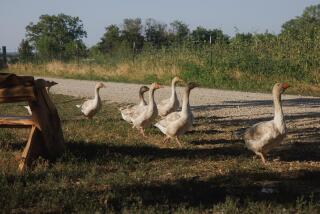Cow crisis?
- Share via
Re “Pollution on the hoof,” editorial, Oct. 15
There is no question that greenhouse gases from all sources will continue to be a major problem for years to come. The Times’ editorial fails to address one crucial component of the equation. Why are dairy herds and other farm animals causing such an alarming increase in greenhouse gases compared with 50 years ago? The bovine population has increased, in all likelihood, because the human population has increased from less than 3 billion to more than 6 billion during that 50-year period. While some areas of the developed world are experiencing declining growth, the population in many underdeveloped areas is soaring.
More people equals more cattle. Trying to solve this problem by encouraging vegetarianism is like the passengers on the Titanic avoiding sinking by using teacups to bail water.
Charles Byrne
Hemet
--
The Times’ editorial lays out several lesser-known facts about this environmental challenge, and does so in a clear and even entertaining way. Manure management has other important environmental benefits as well, including water-quality protection and land-use efficiency. And eating less meat, while legislatively not a politically wise goal, might become a personal goal as the public is educated about its benefits.
Joseph F.C. DiMento
Irvine
--
The Times exhibited foresight in its editorial on the role of livestock agriculture in climate change. The United Nations Food and Agriculture Organization has stated that this sector is “one of the top two or three most significant contributors to the most serious environmental problems,” and the Environmental Protection Agency has linked rising methane and nitrous oxide emissions to the confinement of pigs and dairy cows in larger facilities and an increase in the U.S. poultry population.
Fortunately, thousands of Californians are currently waging a signature-gathering drive to put a measure on the 2008 statewide ballot that would prevent some of the cruelest practices associated with animal agribusiness, which allow these operations to confine greater numbers of animals in fewer facilities.
Wayne Pacelle
President, chief executive
The Humane Society
of the United States
Washington
--
Before you expect a great mass movement away from livestock foodstuffs, perhaps you should present some case studies that show what effect a wholesale reduction in meat consumption would have on the environment. If a huge migration to agriculture-based fuels could lead to food shortages, what might this drastic change in diet do? Something would have to take the place of meat. And what might the result be if both scenarios played out at the same time?
Nels Norene
Camarillo
--
Put some Tums in the cattle feed.
William deLorimier
San Gabriel






